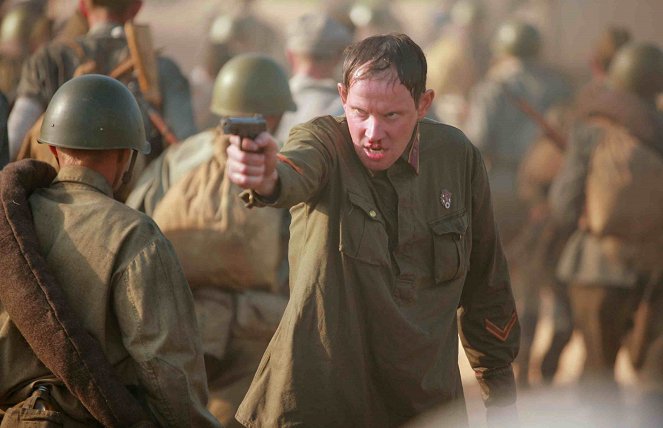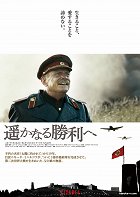Regie:
Nikita MichalkowKamera:
Vladislav OpelyantsMusik:
Eduard ArtemyevBesetzung:
Nikita Michalkow, Oleg Menshikov, Dmitriy Dyuzhev, Andrey Panin, Vladimir Ilyin, Sergey Makovetskiy, Artur Smolyaninov, Sergey Garmash (mehr)Inhalte(1)
Der russische Offizier Kotov hat Stalins Säuberungen und eine gegen ihn verhängte Todesstrafe überlebt. Nun kämpft er an vorderster Front gegen die Invasion der Deutschen. Seine Tochter Nadia opfert sich derweil als Krankenschwester für Russland auf. Je stärker das Land unter Druck gerät, desto mehr werden einst verfeindete Gruppierungen zusammengeschmiedet, um den Feind zurückzuschlagen und Russland zum Sieg gegen die Nazis zu führen. (Silverline Movie Channel)
(mehr)Kritiken (6)
Ein Versagen des Filmemachers gargantuösen Ausmaßes. Ein Film, in dem die Kategorien der Charaktere, Zeit und Raum fatal zusammenbrechen (die im Einser so präzise aufgebaut sind und vor allem perfekt funktionieren). Was bleibt ist nur eine formlose und unkonzeptionelle Mischung an Aufnahmen, die oftmals jedweder Logik und rationaler Absicht entbehren. Das Werk der Zerstörung wird vollendet durch eine unheimlich monotone Musik, eine altväterlich anmutende Kameraführung sowie die Schnittarbeit in Kampfsequenzen, das bedauernswerte Nichtschauspielern von Nikitas geliebter Naděžda und die zum Verzweifeln fehlenden Meinungen und jegliche Kommunikation. Michalkov kann gut und gerne dahinreden, was er mit diesem Film hat erreichen wollen (Güte, Gott, Metaphysik des Krieges), jedoch die Tatsache bleibt, dass er nur die absolute Negation seines einst in Generalmanier entscheidungssicheren und disziplinierten Stils erreicht hat. Das Paradoxon hätte nicht schlimmer sein können - je mehr Aufnahmen der Film hat, desto mehr stechen seine Hilflosigkeit und Leere hervor. Ich habe auf die längere Version gewartet und lege für diese Aussage meine Kopf hin.
()
This sequel is much grander in terms of production and production design than the first film, but it's also been almost twenty years. You can see that Michalkov concentrated on telling a different story, even though some of the characters are the same. It was supposed to be more warlike this time, and it's also very harsh and unpleasant in places, which I like.
()
In Russia, Michalkov's big film met with passionate resistance and the critics eagerly feasted on it, which undoubtedly is largely related to his position and political views. It is undeniable that Burnt by the Sun 2 represents, to a certain extent, a forced continuation of the original film, which is a very compact work culminating in the death of all the main characters, thus practically prohibiting any further continuation. When one character miraculously comes back to life, it is a pleasant surprise, but in this case, it resembles certain biblical scenes. Michalkov simply wanted to make a war epic and used the popularity of his Oscar-winning film, even at the cost of violating his previous artistic work. It is also true that Burnt by the Sun 2 is far from reaching the artistic level of the first film or film 12. The screenplay is too fragmented, with constant shifts in time and numerous characters that are not always adequately utilized. On the one hand, it is seasoned with Hollywood clichés - those miraculous last-minute escapes or instant divine retribution for the villain's immoral act, while on the other, it reflects most of Michalkov's filmography over the past twenty years, with his political views saturated with Russian nationalism and "Slavophile" sentiments that blend Orthodoxy with communism in the name of building a strong state and defending the nation. The film can also be criticized for some smaller script shortcomings, but Michalkov still demonstrates that he is a great director of the present, primarily because he has a sufficiently large budget to present a series of grand war scenes with massive comparisons and a convincing depiction of the apocalypse in the summer months of 1941. No other Russian filmmakers dare to present aerial bombings with period technology or a mass assault of German tanks and infantry on the position of a criminal unit. Overall impression: 45%.
()
I found the sequel (?) to the original film confusing. Nikita Mikhalkov, as a co-writer of the screenplay, would risk having his ankles broken if he had to defend the weird continuation of the story to Annie Wilkes. General Kotov was shot dead in 1936 (original information), in 1941 (new information), not shot at all (latest information). Don’t even get me started on his family. The war scenes sometimes felt like a parody (defecation, being hit by a flare, Ju 87 equipped with a bombshell, etc.). On the other hand, I have to appreciate the extremely realistic scene that showed what a typical man is willing to go through to persuade a woman to reveal her charms.
()
As a frequent viewer of Soviet war movies, I experienced "Russian pathos at its most annoying" to a great extent during the previous regime, but Michalkov's film is definitely not one of them. On the contrary, what I appreciate is his systematic subversion of the clichés of the war genre, either through subtle absurdist humour or farcical situations that illustrate the absurdity of war, or through an unusual authorial approach that is unexpected and therefore refreshing (the final scene with the exposure of breasts). Yes, there is pathos too, but to a very reasonable degree. Michalkov certainly has nothing to be ashamed of and I look forward to the second part of the story.
()
Galerie (19)
Photo © Hollywood Classic Entertainment


Werbung